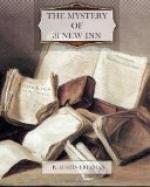“These candles seemed to dispose of the difficulty. They were not necessary for ordinary lighting, since gas was laid on in all three rooms. For what purpose, then, were they used, and in such considerable quantities? I subsequently obtained some of the same brand—Price’s stearine candles, six to the pound—and experimented with them. Each candle was seven and a quarter inches in length, not counting the cone at the top, and I found that they burned in still air at the rate of a fraction over one inch in an hour. We may say that one of these candles would burn in still air a little over six hours. It would thus be possible for the person who inhabited these rooms to go away at seven o’clock in the evening and leave a light which would burn until past one in the morning and then extinguish itself. This, of course, was only surmise, but it destroyed the significance of the night porter’s statement.
“But, if the person who inhabited these chambers was not Jeffrey, who was he?
“The answer to that question seemed plain enough. There was only one person who had a strong motive for perpetrating a fraud of this kind, and there was only one person to whom it was possible. If this person was not Jeffrey, he must have been very like Jeffrey; sufficiently like for the body of the one to be mistaken for the body of the other. For the production of Jeffrey’s body was an essential part of the plan and must have been contemplated from the first. But the only person who fulfills the conditions is John Blackmore.
“We have learned from Mr. Stephen that John and Jeffrey, though very different in appearance in later years, were much alike as young men. But when two brothers who are much alike as young men, become unlike in later life, we shall find that the unlikeness is produced by superficial differences and that the essential likeness remains. Thus, in the present case, Jeffrey was clean shaved, had bad eyesight, wore spectacles and stooped as he walked; John wore a beard and moustache, had good eyesight, did not wear spectacles and had a brisk gait and upright carriage. But supposing John to shave off his beard and moustache, to put on spectacles and to stoop in his walk, these conspicuous but superficial differences would vanish and the original likeness reappear.
“There is another consideration. John had been an actor and was an actor of some experience. Now, any person can, with some care and practice, make up a disguise; the great difficulty is to support that disguise by a suitable manner and voice. But to an experienced actor this difficulty does not exist. To him, personation is easy; and, moreover, an actor is precisely the person to whom the idea of disguise and impersonation would occur.
“There is a small item bearing on this point, so small as to be hardly worth calling evidence, but just worth noting. In the pocket of the waistcoat taken from the body of Jeffrey I found the stump of a ‘Contango’ pencil; a pencil that is sold for the use of stock dealers and brokers. Now John was an outside broker and might very probably have used such a pencil, whereas Jeffrey had no connection with the stock markets and there is no reason why he should have possessed a pencil of this kind. But the fact is merely suggestive; it has no evidential value.




